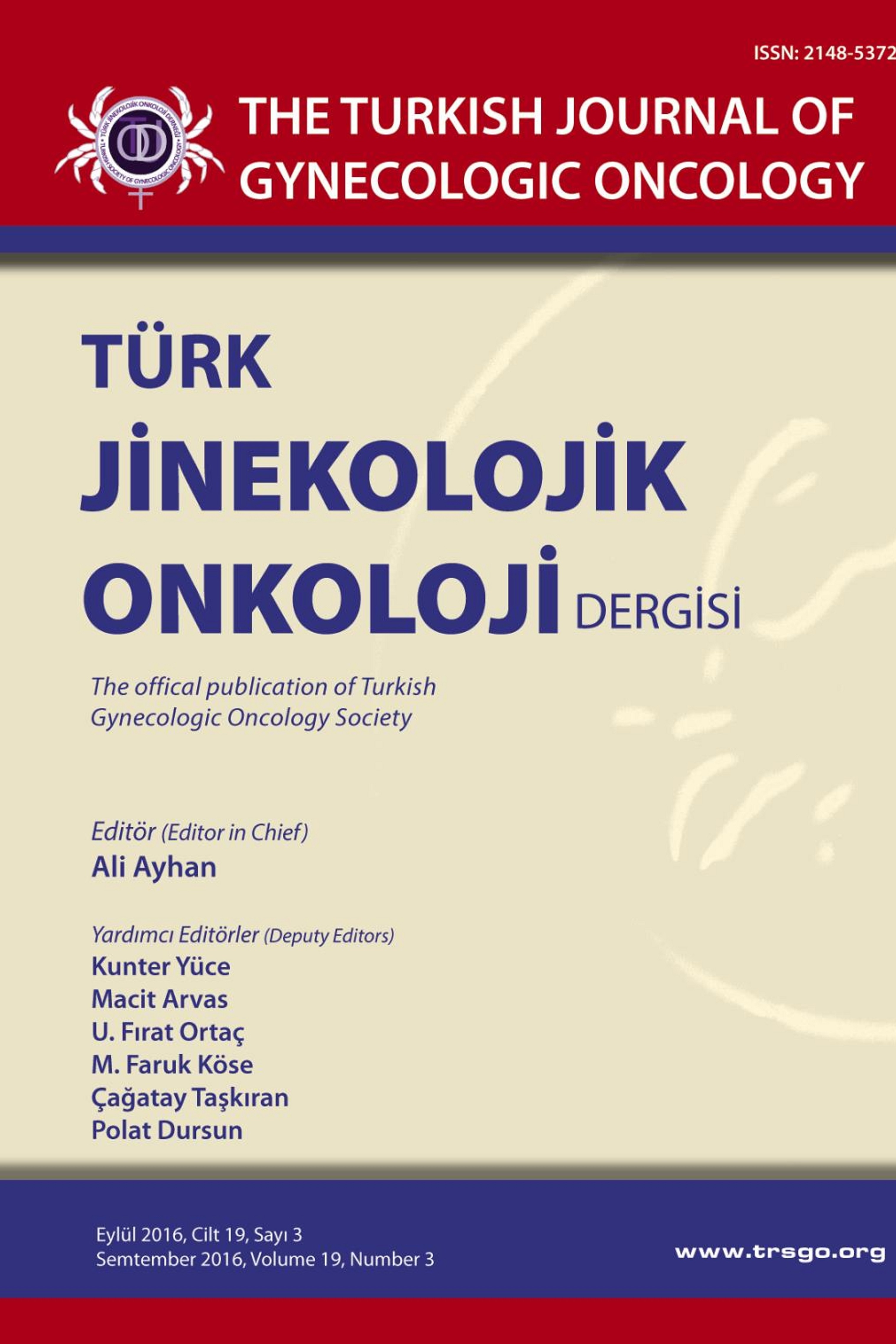Jinekolojik onkoloji yandal eğitim süreci ve temel eksiklikleri, mini anket
Jinekolojik onkoloji yandal eğitim süreci ve temel eksiklikleri, mini anket ÖZET Amaç:Jinekolojik onkoloji cerrahisi yandal eğitim sürecinde en sık hangi konularda eksiklik olduğunu tespit etmek.Materyal ve metod:Dokuz farklı şehirden ve 13 farklı merkezden toplam 36 jinekolojik onkoloji cerrahisi yandal asistanının (jinekolojik onkoloji yandal asistanlarının %52.1’i) katıldığı 10 soruluk mini anket sonuçları sıklık oranlarına göre değerlendirilmiştir.Bulgular:Minimal invaziv jinekolojik onkoloji prosedürlerin yeterince yapılmaması (%61.1) tespit edilmiş olan en sık eksikliktir.Sonuç:Minimal invaziv cerrahi eğitimi jinekolojik onkoloji cerrahisi yandal eğitim sürecinde temel cerrahi eğitimin bir parçası olarak yer almalıdır. Anahtar kelimeler:jinekolojik onkoloji, yandal, eğitim, minimal invaziv, laparoskopi Gynecologic oncology fellowship education process and basic deficiencies, mini questionnaire ABSTRACT Aim: To identify the most common deficiencies that were noticed during gynecologic oncology fellowship education.Materials and methods: Totally 36 gynecologic oncology fellows (52.1% of gynecologic oncology fellows) from nine different cities and 13 different clinics answered a total of 10 questions and the results were categorized due to frequencies.Results: Lack of performing minimally invasive procedures (61.1%) was the most common deficiency of gynecologic oncology fellowship education.Conclusion: Minimally invasive surgery education must be a part of basic surgical education during gynecologic oncology fellowship period. Key words:gynecologic oncology, fellowship, education, minimally invasive, laparoscopyReferences1. Averette HE, Wrennick A, Angioli R. History of gynecologic oncology subspecialty. Surg Clin North Am 2001;81(4):747-51.2. Templeton A. Subspecialty training and academic careers. Baillieres Best Pract Res Clin Obstet Gynaecol 1999;13(3):423-34.3. Hoffman MS, Bodurka DC. Surgical education and training program development for gynecologic oncology: American perspective. Gynecol Oncol 2009;114(2 Suppl):S47-51.4. Tuncer HA, Ozgul N, Kuscu E, et al. Evaluation of a New Oncogynecologic Training Program. Int J Gynecol Cancer 2016;26(7):1333-7.5. Vernooij F, Heintz P, Witteveen E, et al. The outcomes of ovarian cancer treatment are better when provided by gynecologic oncologists and in specialized hospitals: a systematic review. Gynecol Oncol 2007;105(3):801-12.6. Vernooij F, Heintz AP, Coebergh JW, et al. Specialized and high-volume care leads to better outcomes of ovarian cancer treatment in the Netherlands. Gynecol Oncol 2009;112(3):455-61.7. Dahm-Kahler P, Palmqvist C, Staf C, et al. Centralized primary care of advanced ovarian cancer improves complete cytoreduction and survival - A population-based cohort study. Gynecol Oncol 2016;142(2):211-6.8. Manchanda R, Godfrey M, Wong-Taylor LA, et al. The need for accredited training in gynaecological oncology: a report from the European Network of Young Gynaecological Oncologists (ENYGO). Ann Oncol 2013;24(4):944-52.9. Gershenson DM. Mentoring in gynecologic oncology fellowship training and beyond. Gynecol Oncol 2012;125(1):1-2.10. Rabinovich A. Minimally invasive surgery for endometrial cancer. Curr Opin Obstet Gynecol 2015;27(4):302-7.11. Frumovitz M, Soliman PT, Greer M, et al. Laparoscopy training in gynecologic oncology fellowship programs. Gynecol Oncol 2008;111(2):197-201.12. Miao J, Fleury AC, Kushnir CL, et al. Post fellowship training in "new-to-them" surgical techniques: assessment of learning curve characteristics. Gynecol Oncol 2011;121(3):620-4.13. Walker JL, Piedmonte MR, Spirtos NM, et al. Laparoscopy compared with laparotomy for comprehensive surgical staging of uterine cancer: Gynecologic Oncology Group Study LAP2. J Clin Oncol 2009;27(32):5331-6.14. McVey Ruaidhri M. LM, Giede Christopher, Grantcharov Teodor P., and Covens Allan. Introduction of a Structured Assessment of Clinical Competency for Fellows in Gynecologic Oncology: A Pilot Study. Journal of Gynecologic Surgery 2015;31(1):17-21.15. McVey RM, Clarke E, Segev Y, et al. Determining the role of a national objective assessment of surgical skills in gynecological oncology: an e-Delphi methodology. Int J Gynecol Cancer 2014;24(6):1098-104.16. Kesterson JP, Szender, J.B., Schaefer, E. et al. Evaluation of Association Between Gynecologic Oncology Fellowship Length and a Career in Academic Medicine. J Canc Educ 2016.
___
- 1. Averette HE, Wrennick A, Angioli R. History of gynecologic oncology subspecialty. Surg Clin North Am 2001;81(4):747-51.2. Templeton A. Subspecialty training and academic careers. Baillieres Best Pract Res Clin Obstet Gynaecol 1999;13(3):423-34.3. Hoffman MS, Bodurka DC. Surgical education and training program development for gynecologic oncology: American perspective. Gynecol Oncol 2009;114(2 Suppl):S47-51.4. Tuncer HA, Ozgul N, Kuscu E, et al. Evaluation of a New Oncogynecologic Training Program. Int J Gynecol Cancer 2016;26(7):1333-7.5. Vernooij F, Heintz P, Witteveen E, et al. The outcomes of ovarian cancer treatment are better when provided by gynecologic oncologists and in specialized hospitals: a systematic review. Gynecol Oncol 2007;105(3):801-12.6. Vernooij F, Heintz AP, Coebergh JW, et al. Specialized and high-volume care leads to better outcomes of ovarian cancer treatment in the Netherlands. Gynecol Oncol 2009;112(3):455-61.7. Dahm-Kahler P, Palmqvist C, Staf C, et al. Centralized primary care of advanced ovarian cancer improves complete cytoreduction and survival - A population-based cohort study. Gynecol Oncol 2016;142(2):211-6.8. Manchanda R, Godfrey M, Wong-Taylor LA, et al. The need for accredited training in gynaecological oncology: a report from the European Network of Young Gynaecological Oncologists (ENYGO). Ann Oncol 2013;24(4):944-52.9. Gershenson DM. Mentoring in gynecologic oncology fellowship training and beyond. Gynecol Oncol 2012;125(1):1-2.10. Rabinovich A. Minimally invasive surgery for endometrial cancer. Curr Opin Obstet Gynecol 2015;27(4):302-7.11. Frumovitz M, Soliman PT, Greer M, et al. Laparoscopy training in gynecologic oncology fellowship programs. Gynecol Oncol 2008;111(2):197-201.12. Miao J, Fleury AC, Kushnir CL, et al. Post fellowship training in "new-to-them" surgical techniques: assessment of learning curve characteristics. Gynecol Oncol 2011;121(3):620-4.13. Walker JL, Piedmonte MR, Spirtos NM, et al. Laparoscopy compared with laparotomy for comprehensive surgical staging of uterine cancer: Gynecologic Oncology Group Study LAP2. J Clin Oncol 2009;27(32):5331-6.14. McVey Ruaidhri M. LM, Giede Christopher, Grantcharov Teodor P., and Covens Allan. Introduction of a Structured Assessment of Clinical Competency for Fellows in Gynecologic Oncology: A Pilot Study. Journal of Gynecologic Surgery 2015;31(1):17-21.15. McVey RM, Clarke E, Segev Y, et al. Determining the role of a national objective assessment of surgical skills in gynecological oncology: an e-Delphi methodology. Int J Gynecol Cancer 2014;24(6):1098-104.16. Kesterson JP, Szender, J.B., Schaefer, E. et al. Evaluation of Association Between Gynecologic Oncology Fellowship Length and a Career in Academic Medicine. J Canc Educ 2016.
